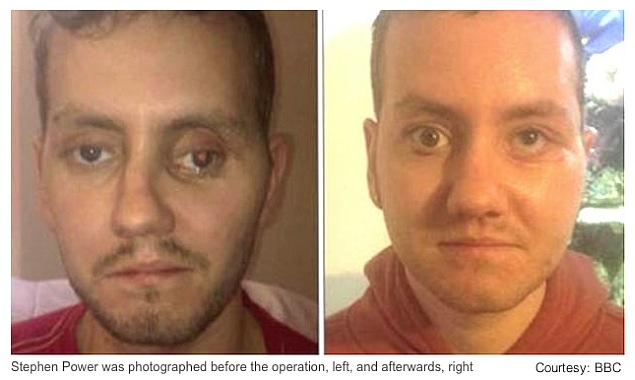- Home
- Others
- Others News
- 3D printing repairs accident victim's face
3D printing repairs accident victim's face

The surgery was performed on Stephen Power at Morriston Hospital in Swansea.
Power met with an accident in 2012 and the emergency surgery that followed could not restore his face.
The recent eight-hour operation at Morriston Hospital was the culmination of months of 3D planning and printing that has pushed the boundaries of what surgeons can achieve, a statement from the hospital said.
The team used scanned 3D images of Power's face to design guides to cut and position the bones, as well as plates to hold the bones in place.
All the models - along with the finished guides and medical-grade titanium implants - were produced by 3D printing.
"Stephen had a very complex injury and correcting it involved bones having to be re-cut into several fragments," said Adrian Sugar, consultant maxillofacial surgeon at Morriston Hospital.
"It made sense to plan it in three dimensions and that is why 3D printing came in - and successive 3D printing, as at every different stage we had a model," Sugar said.
For the surgery, the doctors did two types of model planning - virtual model planning on a computer screen and physical model planning.
"Also we produced guides at each stage of the surgical process, not only to cut the bone but to reposition the bones, and then we had custom implants 3D printed," Sugar said.
Before the operation, Stephen had been self-conscious about his appearance. He continued to wear glasses despite his improving vision, to disguise his cheek and eye.
"From this operation I can't really explain how well it has gone. It has just made me look a lot better. I take my hat off to them," Power, who used to wear glasses to disguise his disfigured cheek and eye, said of the doctors who worked their magic on him.
Catch the latest from the Consumer Electronics Show on Gadgets 360, at our CES 2026 hub.
Related Stories
- Samsung Galaxy Unpacked 2025
- ChatGPT
- Redmi Note 14 Pro+
- iPhone 16
- Apple Vision Pro
- Oneplus 12
- OnePlus Nord CE 3 Lite 5G
- iPhone 13
- Xiaomi 14 Pro
- Oppo Find N3
- Tecno Spark Go (2023)
- Realme V30
- Best Phones Under 25000
- Samsung Galaxy S24 Series
- Cryptocurrency
- iQoo 12
- Samsung Galaxy S24 Ultra
- Giottus
- Samsung Galaxy Z Flip 5
- Apple 'Scary Fast'
- Housefull 5
- GoPro Hero 12 Black Review
- Invincible Season 2
- JioGlass
- HD Ready TV
- Laptop Under 50000
- Smartwatch Under 10000
- Latest Mobile Phones
- Compare Phones
- OPPO Reno 15 FS
- Red Magic 11 Air
- Honor Magic 8 RSR Porsche Design
- Honor Magic 8 Pro Air
- Infinix Note Edge
- Lava Blaze Duo 3
- Tecno Spark Go 3
- iQOO Z11 Turbo
- Lenovo Yoga Slim 7x (2025)
- Lenovo Yoga Slim 7a
- Lenovo Idea Tab Plus
- Realme Pad 3
- Moto Watch
- Garmin Quatix 8 Pro
- Haier H5E Series
- Acerpure Nitro Z Series 100-inch QLED TV
- Asus ROG Ally
- Nintendo Switch Lite
- Haier 1.6 Ton 5 Star Inverter Split AC (HSU19G-MZAID5BN-INV)
- Haier 1.6 Ton 5 Star Inverter Split AC (HSU19G-MZAIM5BN-INV)







![[Sponsored] Haier C90 OLED TV | Dolby Vision IQ, 144Hz OLED and Google TV in Action](https://www.gadgets360.com/static/mobile/images/spacer.png)









